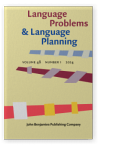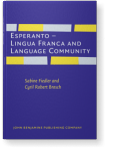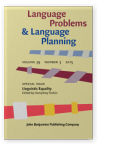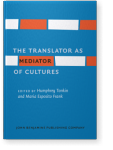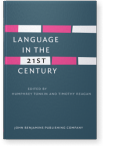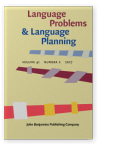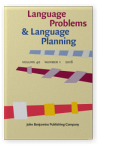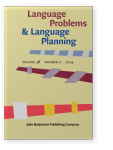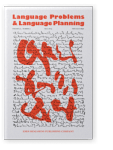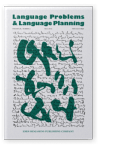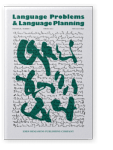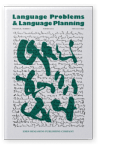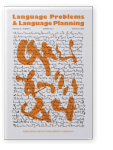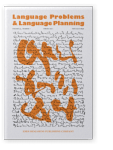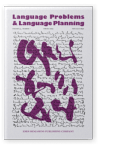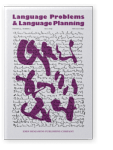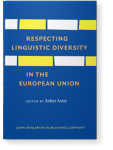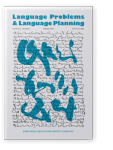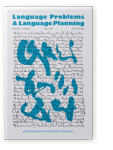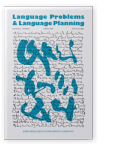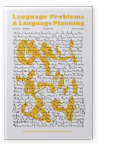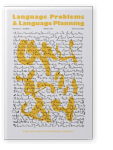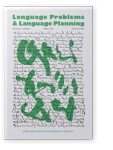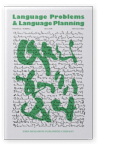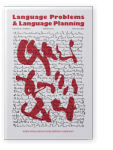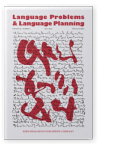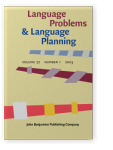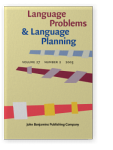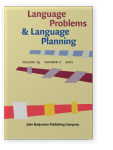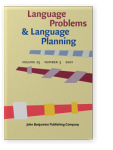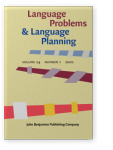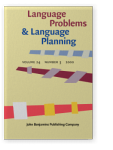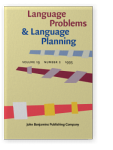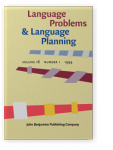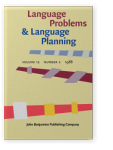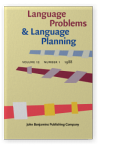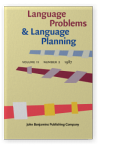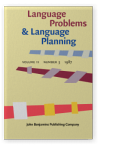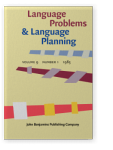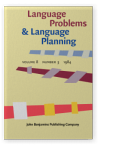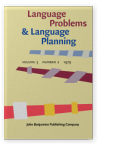Humphrey Tonkin
List of John Benjamins publications for which Humphrey Tonkin plays a role.
Journal
Book series
Titles
Linguistic Equality
Edited by Humphrey Tonkin
Special issue of Language Problems and Language Planning 39:3 (2015) v, 101 pp.
Subjects Language policy | Sociolinguistics and Dialectology
The Translator as Mediator of Cultures
Edited by Humphrey Tonkin and Maria Esposito Frank
[Studies in World Language Problems, 3] 2010. x, 201 pp.
Subjects Language policy | Multilingualism | Translation Studies
Language in the Twenty-First Century: Selected papers of the millennial conferences of the Center for Research and Documentation on World Language Problems, held at the University of Hartford and Yale University
Edited by Humphrey Tonkin and Timothy Reagan
[Studies in World Language Problems, 1] 2003. vi, 209 pp.
Subjects Language policy | Sociolinguistics and Dialectology
2016 Invented cities, invented languages: Esperanto and urban textuality, 1887–1914 Language Problems and Language Planning 40:1, pp. 85–99 | Article
L. L. Zamenhof saw the creation of his proposed international language, Esperanto, as a process of construction, rather like the building of a city. This new city of words would replace the walls of language difference that had previously separated the nations. His poems imagined a new “foundation”… read more
2015 The search for linguistic equality Linguistic Equality, Tonkin, Humphrey (ed.), pp. 221–226 | Article
Five papers from the symposium on language and equality, held in New York in 2014 and organized by the Working Group on Language and the United Nations, make up this special issue of Language Problems and Language Planning. The symposium highlighted the difficulty of defining the nature of language… read more
2014 Review of Spolsky (2012): The Cambridge handbook of language policy Language Problems and Language Planning 38:2, pp. 221–223 | Review
2012 John Milton and Paul Bandia (eds.). Agents of Translation. Language Problems and Language Planning 36:1, pp. 85–87 | Review
2011 Chaos in Esperanto-Land: Echoes of the Holocaust Language Problems and Language Planning 35:2, pp. 161–171 | Article
The Holocaust had a profound effect on the Esperanto movement. Many of the leading members of the Esperanto language community perished, and some survived. Recent years have seen a revival of interest in those who died and those who lived. Among the dead were most of the family of L. L. Zamenhof,… read more
2010 1. Translation as reconciliation: A conversation about politics, translation, and multilingualism in South Africa The Translator as Mediator of Cultures, Tonkin, Humphrey and Maria Esposito Frank (eds.), pp. 17–36 | Article
South Africa is an example of the urgent need for translation. In moving away from two official languages to eleven, South Africa, limited in resources and unprepared to handle such linguistic complexity at the level of government, has in effect empowered English as the prestige language. The… read more
2010 10. The semantics of invention: Translation into Esperanto The Translator as Mediator of Cultures, Tonkin, Humphrey and Maria Esposito Frank (eds.), pp. 169–190 | Article
The particular challenges of translating Winnie-the-Pooh into a planned language like Esperanto include grappling with culture-specific and idiomatic phraseology, word-play, the choice of proper names, and an audience divided between children and adults. The problem is none the less made simpler… read more
2009 Review of Okrent (2009): In the Land of Invented Languages Language Problems and Language Planning 33:3, pp. 291–293 | Review
2008 Linguistic diversity in the European Union: An overview Respecting Linguistic Diversity in the European Union, Arzoz, Xabier (ed.), pp. 47–72 | Article
An examination of the extent and diversity of languages in Europe and specifically in the European Union reveals that there are over sixty indigenous languages currently spoken in, and historically established in, the territory of the EU, along with almost thirty sign languages. The authors… read more
2008 Review of Privat & Lins (2007): Vivo de Zamenhof Language Problems and Language Planning 32:2, pp. 213–214 | Review
2007 Review of Nanovfszky (2004): The Finno-Ugric World Language Problems and Language Planning 31:2, pp. 208–209 | Review
2007 Recent studies in Esperanto and interlinguistics: 2006 Language Problems and Language Planning 31:2, pp. 169–196 | Article
The mainstream conduct of research on Esperanto and interlinguistics is a relatively recent phenomenon, which of late has grown easier through better access to libraries and a growing body of scholarly work. The situation of Esperanto and interlinguistics in universities remains stable. However,… read more
2007 Review of Korĵenkov (2005): Historio de Esperanto Language Problems and Language Planning 31:1, pp. 79–83 | Review
2006 Review of Wright (2004): Language Policy and Language Planning Language Problems and Language Planning 30:3, pp. 305–306 | Review
2005 Barry Taylor (ed.). Foreign-Language Printing in London 1500–1900 Language Problems and Language Planning 29:3, pp. 287–288 | Review
2005 Review of Adams (2003): Bilingualism and the Latin Language Language Problems and Language Planning 29:3, pp. 294–297 | Review
2003 Why learn foreign languages? Thoughts for a new millennium Language in the Twenty-First Century: Selected papers of the millennial conferences of the Center for Research and Documentation on World Language Problems, held at the University of Hartford and Yale University, Tonkin, Humphrey and Timothy Reagan (eds.), pp. 145–155 | Article
2003 Review of Nunberg (2001): The Way We Talk Now Language Problems and Language Planning 27:2, pp. 208–210 | Review
2003 Introduction: Language and the pursuit of the millennium Language in the Twenty-First Century: Selected papers of the millennial conferences of the Center for Research and Documentation on World Language Problems, held at the University of Hartford and Yale University, Tonkin, Humphrey and Timothy Reagan (eds.), pp. 1–7 | Article
2001 Review of Nettle (1999): Linguistic Diversity Language Problems and Language Planning 25:2, pp. 189–192 | Review
2001 Review of Calvet (1999): Pour une écologie des langues du monde Language Problems and Language Planning 25:3, pp. 305–311 | Review
2000 Editorial: Responding to Changes in the Field Language Problems and Language Planning 24:1, pp. 1–10 | Article
Since LMLP, the precursor of LPLP, began publication over thirty years ago, the field of sociolinguistics and language policy has changed. Dedicated to the study of the terrain where languages intersect, the journal began in an environment in which the principal problem was the failure of… read more
1995 A Little-Known Linguistic and Cultural Treasure: The Hector Hodler Library in Rotterdam Language Problems and Language Planning 19:2, pp. 185–187 | Miscellaneous
1994 Conferences Examine Language in Post-Cold-War Europe Language Problems and Language Planning 18:1, pp. 59–60 | Miscellaneous
1988 Language and Culture in International Organizations Language Problems and Language Planning 12:2, pp. 169–170 | Miscellaneous
1988 "100 Jahre Esperanto" Language Problems and Language Planning 12:1, pp. 44–51 | Miscellaneous
1987 Conference Reports/Raportoj pri Konferencoj/Konferenzberichte/Berichten over Conferences Language Problems and Language Planning 11:2, pp. 201–207 | Section header
1987 One Hundred Years of Esperanto: A Survey Language Problems and Language Planning 11:3, pp. 264–282 | Article
RESUMO Cent jaroj de Esperanto: Superrigardo La unua lernolibro de Esperanto aperis en 1887. Ĝia aǔtoro, L. L. Zamenhof, kreis lingvan movadon, kies historio daǔras seninterrompe ĝis la hodiaǔa tago. La lingvo mem estas miksaĵo de eüropaj elementoj kaj apriora, esence internacia, strukturo. Tra la… read more
1987 Editorial Language Problems and Language Planning 11:3, pp. 261–263 | Article
1985 Redakcia Artikolo Language Problems and Language Planning 9:1, pp. 1–2 | Article
1984 Editorial Language Problems and Language Planning 8:3, pp. 279–280 | Article
1979 Real Character and Lunatic Language: Language Planning in the 17th and 18th Centuries (Review Essay) Language Problems and Language Planning 3:2, pp. 76–85 | Article
Reala skribajo kaj lima lingvo: lingvo-planado en la 17-a kaj l8-a jarcentoj Lastatempe okazis revivigo de interesigo pri la tielnomataj filozofiaj lingvoj de la deksepa jarcento. Tion kauzis versajne sangigantaj starpunktoj rilate artefaritajn Hngvosistemojn kaj konstato, ke la lingva teorio estas… read more
